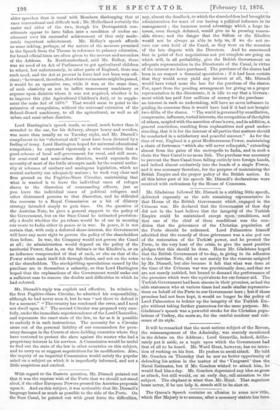Lord Hartington's speech reads, as usual, much better than it
sounded to the ear, for his delivery, always heavy and wooden, was more than usually so on Tuesday night, and Mr. Disraeli's compliment to his "rhetorical skill" must have been dictated by a feeling of irony. Lord Hartington hoped for universal educational compulsion ; he expressed vigorously a wise conviction that a good scheme of local self-government for rural, and still more, for semi-rural and semi-urban districts, would supersede the necessity of most of the futile attempts made by the central autho- rity at Etchemes of sanitary and analogous legislation, which no central authority can adequately mature ; he took very clear and firm ground on the Fugitive-Slave Circular, maintaining that what is wanted is to leave the individual cases of refugee slaves to the discretion of commanding officers, just as you leave the individual cases of political refugees and other distresssed persons to that discretion, and he ridiculed the recourse to a Royal Commission as a bit of dilatory strategy intended simply to gain time. On the question of the Austrian Note, he gave a general support to the policy of the Government, but on the Suez Canal he intimated provision- ally a doubt whether the pu rchase would be of use in securing our route to India either in peace or in war. In peace, it is not certain that, with only a deferred share-interest, the Government will have any more right to govern the policy of the shareholders than before. In war, the Company would not govern the Canal at all ; its administration would depend on the policy of the territorial Power, that is, on the Sultan's or the Khedive's, or on an influence compounded of that of each, or else on that of the Power which made itself felt through theirs, and not on the votes of the shareholders. The stockjobbing speculations caused by the purchase are in themselves a calamity, so that Lord Hartington hoped that the explanations of the Government would make out a sufficient case to remove the doubts and difficulties to which he had referred.


































 Previous page
Previous page